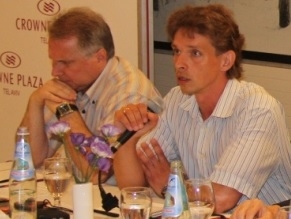|
Euroasian Jewish News

Left to right: Alexander Zinker, Israeli politologist; Vyacheslav Likhachev, the author of the report
|
Report on Ukrainian Radical Right Presented in Tel-Aviv
28.06.2013 On June 27, a panel took place titled “Anti-Semitism and the Growth of Popularity of the National Radical Movement in Ukraine: Is There a Threat to the Jewish Community?” A published report titled “Right-wing extremism in Ukraine: the phenomenon of 'Svoboda'” was presented at the panel. The author of the report, expert in national-radicalism and xenophobia, EAJC General Council member Vyacheslav Likhachev noted in his speech that the electoral success of the radically right-wing Svoboda party needs to be examined by experts and the global community. This is a party that was not long ago called national-socialist, had a neo-Nazi symbol on its emblem, and was fringe for 20 years of its existence. But at these parliamentary elections it was able to create a parliamentary group and delegate its representative to the post of Vice Speaker. According to the expert, the cause for this lies mostly in the political context, which is characterized by radical adversity between the party in power and the opposition, as well as the long crisis of moderate Ukrainian national-democratic parties.
Naturally, the fact that a political power is not shirking anti-Semitic rhetoric and is encouraging violence from youth extremist street groups worries Israel. Vyacheslav Likhachev, however, painted a calming picture to the journalists and political studies scholars present at the panel. According to him, the success of Svoboda at the election does not mean a sharp increase in anti-Semitic moods in Ukrainian society. The expert provided data of the EAJC monitoring of anti-Semitism, which has been going on for many years, according to which anti-Semitism has been steadily on the decline since the early 2000s. The author of the report presented the results of sociological studies that show Ukrainian society is tolerant to Jews and that there is no growth of anti-Semitic moods among the peoples. The expert believes that the Jewish community is not presently under any real threat and that the panicked passages that can be read in some recent publications are quite an overreaction to the actual situation at hand.
According to Vyacheslav Likhachev, the voter who chose Svoboda did not vote for the anti-Semitic and xenophobic rhetoric of the party. The party was supported because no one doubted its allegiance to the opposition and its readiness to use radical methods to defend what many of the voters see as Ukrainian national interests. It's another thing entirely that the use of anti-Semitic rhetoric did not stop the voters. Anti-Semitism is also not the only problem with Svoboda's ideology, campaigning, and political practice, as its activists are violent towards political opponents, human rights defenders, and minority members, while Svoboda's leaders and ideologists condone this violence.
Vyacheslav Likhachev noted that in other Eastern European countries similarly radically-right-wing parties have at times received even more electoral support; however, they usually found themselves politically isolated, as Europe has very clear cut criteria of what is allowed in public rhetoric and what is not. It is a peculiarity of the Ukrainian situation that radical right wing groups, who are absolutely unashamed of their anti-Semitism, are an integral part of an opposition that sells itself as liberal and pro-European. This “tolerance to intolerance” does not mean, of course, that the entire opposition could plausibly be described as neo-Nazist and xenophobic, as some Ukrainian pro-goverment commentators would as part of their informational campaign. But the fact that other parties are working with Svoboda certainly legitimates the use of xenophobic, including anti-Semitic, rhetoric and is thus a serious problem.
Likhachev believes that it is extremely important in this situation to give a clear and unambiguous evaluation to manifestations of anti-Semitism and xenophobia.
|
|
